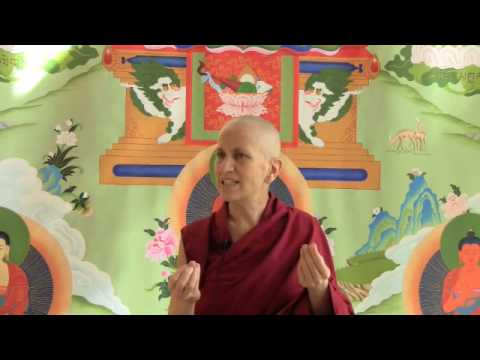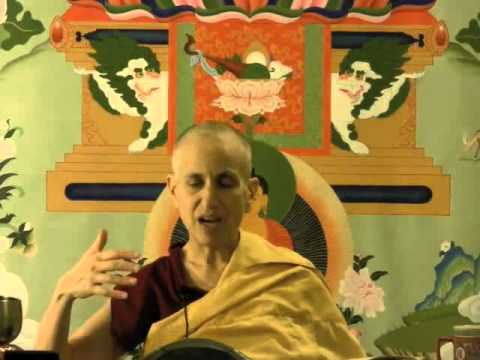Mutual dependence in generosity
Part of a series of Bodhisattva's Breakfast Corner talks given during the Green Tara Winter Retreat from December 2009 to March 2010.
- Ways in which mutual dependence is talked about
- Cause and result is a way of talking about mutual dependence as well as causal dependence
- Agent, action, and object are also mutually dependent
Green Tara Retreat 063: Mutual dependence in generosity (download)
One other thing about dependence, or mutual dependence, or relational dependence, is that it is talked about in several ways: the relationship between whole and part, between cause and result, and long and short, and so on. Some of these things are also in relationship of causal dependence, like cause and result, but then other ones like long and short aren’t also causally dependent—they are just relationally dependent. There is some overlap between these different ways of dependence so don’t think of them as inherently existent categories.
Another way they often talk about the mutual dependence is in terms of agent, action, and object. You have probably heard this often because they recommend that at the end of a session (at the end of our day) that we dedicate our merit, seeing the agent, the action, and the object as all dependent on each other and thus empty of inherent existence. Remember that? Here what you are getting at is this. The person who did the virtuous action is the agent. The action that they did, an action of generosity, an action of meditation, or whatever it is, is the action. The object is whoever they did the action in relationship to or whatever object they were dealing with. We see these three things as interrelated and not existing on their own.
Very often we have the feeling like in an action of generosity: “Okay, there is the agent—there’s this person over here all by themselves, an inherently existent giver. Then there’s this action of giving over here. And there is this object—the offering that is being given. And there’s the recipient over here. They’re all very distinct and inherently existent, and they just kind of clunk into each other and that creates merit.” It’s not actually like that. That person doesn’t become a giver unless there’s a recipient, and an object, and an action. There’s no action unless there is an object, and a recipient, and an agent. There’s no recipient unless there’s the object, and the action, and the agent. All of these things come about in dependence upon each other—none of them exist there on their own.
Here you can see why when somebody is begging and saying, “I want, I want,” or “I need, I need,” this is why bodhisattvas get so happy. They realize that to create an action of generosity, they need somebody to give to, and without that person to give to their whole practice of generosity is stifled. The bodhisattva sees the kindness of the recipient for offering them the opportunity to create merit by being generous. Also when the bodhisattvas hear somebody saying, “I can’t stand your guts,” they are so happy. (Don’t worry, I’m still working on this!) They are so happy because they realize that in order to become a buddha you have to practice patience. There’s no way that you are going to become a buddha without practicing patience, and to practice patience you need somebody who is disturbing your mind, and who is interfering with your happiness, and who is causing you misery. When a bodhisattva has that person, then they say, “Oh, here’s the dependent arising for me to practice fortitude, the circumstances are coming together. This is fantastic!” They appreciate this person who is saying, “I can’t stand your guts.” You can see how it really is true, isn’t it? We need these people in our lives so that we have the opportunity to practice; we can’t do those practices unless there is the person in relationship to who we do them.
We see the action that we’ve done as dependent and thus as empty—all the different components are empty. Also then, the action of dedicating is an action of generosity, and that one similarly is dependent and thus all the different parts are empty of true existence. They say that seeing our virtue in this way and dedicating in this way is a very powerful practice, because then our virtuous action isn’t just the collection of merit, it also becomes part of the collection of wisdom.
Audience: I have a question. The agent, object, action, this way of thinking: it seems like that would describe what Shantideva was trying to say about this gap between the cognizer and the object cognized. The cognizer would be the agent, the object would be object, and the action would be the cognizing. Because that was hard for me to understand, but this seems to be the framework.
Venerable Thubten Chodron (VTC): What context was he saying that in?
Audience: It is in the ninth chapter where he is talking about how we see those things as truly existent, there is actually this gap. We think there is this gap, like there is me with my mind cognizing the object.
VTC: He’s talking about how contact, which is the coming together of the sense organ, the object, and the consciousness, how contact is dependently related. Therefore, because contact is dependent, then feeling, which arises as a result of contact, is also dependent.
Audience: Do all the four tenet schools accept mutual dependence?
VTC: That’s more the Prasangika view. Because the Vaibashikas, the Sautrantikas, I am not sure about the others, but at least the first two… Actually, maybe all of the other schools just see the result as dependent on the cause in causal dependence. They don’t see that cause and result having those identities, is mutually dependent. They just see it as going one way, cause leading to result.
Venerable Thubten Chodron
Venerable Chodron emphasizes the practical application of Buddha’s teachings in our daily lives and is especially skilled at explaining them in ways easily understood and practiced by Westerners. She is well known for her warm, humorous, and lucid teachings. She was ordained as a Buddhist nun in 1977 by Kyabje Ling Rinpoche in Dharamsala, India, and in 1986 she received bhikshuni (full) ordination in Taiwan. Read her full bio.


